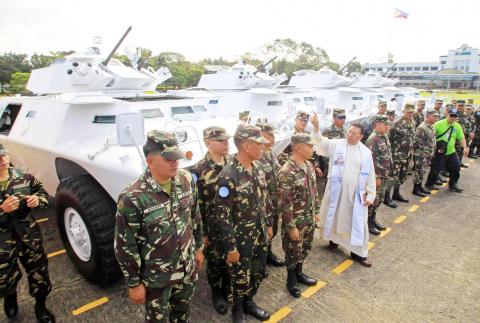Pope Francis is to return to Asia for the second time in less than six months, traveling to Sri Lanka and the Philippines in coming days to underscore his concern for inter-religious dialogue, poverty and the environment.
Security will be a main issue in both countries, particularly in the Philippines, Asia’s only majority Catholic country, where up to 6 million people are expected to attend an outdoor Mass on Sunday.
Up to 40,000 police, troops and reservists are to take part in what Philippine Armed Forces Chief General Gregorio Catapang has described as the nation’s biggest-ever security operation.

Photo: Reuters
“There will be soldiers rappelling up and down helicopters to rescue the pope in case he will be pinned down by a sea of people. We may airlift or use naval boats to bring the pope to safety if necessary,” he said.
When pope John Paul visited Manila in 1995, security perimeters were breached and he had to be taken by helicopter to another site because his car could not get through a sea of about 5 million people.
One theme of the trip is to be climate change. During his stay in the Philippines he is to visit Tacloban, where Typhoon Haiyan killed 6,300 people in 2013.
Sri Lanka is among the Asian countries experts say is set to see sea level rises likely to displace people and adversely affect tourism and fisheries. The Vatican says Francis, who is preparing an encyclical on the environment, plans to speak about the issue several times.
While pope John Paul made a number of trips to Asia — visiting both countries in 1995 — Francis’ immediate predecessor, Benedict VVI, who resigned in 2013, made none to a region the Vatican sees as a potential growth area.
“We have to recover the presence of a pope in this preponderant area of humanity,” Vatican spokesman Father Federico Lombardi said. Only about 3 percent of people in the region are Catholic.
“This continent in many ways represents a frontier for the church,” Italian Jesuit magazine Civilta Cattolica editor Father Antonio Spadaro said. “Inter-religious dialogue is tested every day and young Churches there are growing.”
The pope is scheduled to arrive in the Sri Lankan capital, Colombo, on Tuesday morning days after Sri Lankan President Mahinda Rajapaksa lost his bid for a third term, ending a decade of rule that critics say had become authoritarian and marred by nepotism and corruption.
Lombardi said he hoped the surprise election result in the former British colony would not give rise to any “inconveniences that will affect the serenity and tranquility of the trip.”
The main purpose of the three-day stop in Sri Lanka is to canonize Joseph Vaz, a Catholic priest credited with rebuilding the church there in the 17th and 18th centuries after Dutch occupiers imposed Calvinism as the official religion.
The nation is about 70 percent Buddhist, 13 percent Hindu, 10 percent Muslim and only about 7 percent Catholic. Francis is expected to stress the need for worldwide inter-religious dialogue, and speaking after the recent attacks in France, again condemn the concept of violence in God’s name.
He is also expected to preach a message of reconciliation during a visit to Madhu, a town in the north that was the center of a 26-year civil war that ended with the defeat of ethnic Tamil rebels in 2009.
Vatican officials say that despite its minority status, the Catholic Church in Sri Lanka can help reconciliation because it includes members of both ethnic groups — Sinhalese and Tamil.
Francis is scheduled to arrive on Thursday in the Philippines, where more than 80 percent of people are Catholic. One main topic in the former Spanish colony is expected to be the effect of immigration on the family. The search for jobs outside the country — mostly in domestic work — has put strains on many families.

Nauru has started selling passports to fund climate action, but is so far struggling to attract new citizens to the low-lying, largely barren island in the Pacific Ocean. Nauru, one of the world’s smallest nations, has a novel plan to fund its fight against climate change by selling so-called “Golden Passports.” Selling for US$105,000 each, Nauru plans to drum up more than US$5 million in the first year of the “climate resilience citizenship” program. Almost six months after the scheme opened in February, Nauru has so far approved just six applications — covering two families and four individuals. Despite the slow start —

North Korean troops have started removing propaganda loudspeakers used to blare unsettling noises along the border, South Korea’s military said on Saturday, days after Seoul’s new administration dismantled ones on its side of the frontier. The two countries had already halted propaganda broadcasts along the demilitarized zone, Seoul’s military said in June after the election of South Korean President Lee Jae-myung, who is seeking to ease tensions with Pyongyang. The South Korean Ministry of National Defense on Monday last week said it had begun removing loudspeakers from its side of the border as “a practical measure aimed at helping ease

DEADLY TASTE TEST: Erin Patterson tried to kill her estranged husband three times, police said in one of the major claims not heard during her initial trial Australia’s recently convicted mushroom murderer also tried to poison her husband with bolognese pasta and chicken korma curry, according to testimony aired yesterday after a suppression order lapsed. Home cook Erin Patterson was found guilty last month of murdering her husband’s parents and elderly aunt in 2023, lacing their beef Wellington lunch with lethal death cap mushrooms. A series of potentially damning allegations about Patterson’s behavior in the lead-up to the meal were withheld from the jury to give the mother-of-two a fair trial. Supreme Court Justice Christopher Beale yesterday rejected an application to keep these allegations secret. Patterson tried to kill her

CORRUPTION PROBE: ‘I apologize for causing concern to the people, even though I am someone insignificant,’ Kim Keon-hee said ahead of questioning by prosecutors The wife of South Korea’s ousted former president Yoon Suk-yeol yesterday was questioned by a special prosecutor as investigators expanded a probe into suspicions of stock manipulation, bribery and interference in political party nominations. The investigation into Kim Keon-hee is one of three separate special prosecutor probes launched by the government targeting the presidency of Yoon, who was removed from office in April and rearrested last month over his brief imposition of martial law on Dec. 3 last year. The incident came during a seemingly routine standoff with the opposition, who he described as “anti-state” forces abusing their legislative majority to obstruct